







Call Us On (877)-585-0677 To Speak To An Expert Today!
Certified Sex Addiction Therapists (CSATs):
Exploring the Controversy and Understanding Their Role
Imagine feeling overwhelmed by compulsive sexual behaviors that seem beyond your control, leaving you feeling ashamed, isolated, and unsure where to turn for help. This is a reality for many individuals grappling with what some professionals refer to as "sex addiction."
However, the concept of sex addiction is not without controversy. While some therapists specialize in treating these behaviors through the lens of addiction, others question the validity of this approach. Understanding this controversy will help you hire the right therapist or counselor.
Certified Sex Addiction Therapists (CSATs) are professionals who offer specialized support to individuals struggling with compulsive sexual behaviors. They aim to address not just the behaviors themselves but also the underlying issues that may contribute to them.
However, it's important to understand that the "sex addiction" model they use is a subject of significant debate within the mental health and medical communities according to experts.

In this article, we'll delve into the role of CSATs, the training they undergo, and the controversies surrounding the sex addiction model.
We'll explore different perspectives to provide a balanced understanding, helping you make informed decisions about the options available for treating compulsive sexual behaviors.
Understanding Compulsive Sexual Behaviors and the Sex Addiction Controversy

Defining the Issue
Compulsive sexual behaviors involve repetitive sexual activities that feel out of control and may lead to distress or impairment in daily functioning.
It is a complicated, multifaceted condition that only describes the symptoms, not the underlying mental health issues driving addict behavior like lying, a lack of empathy towards partners, low self-esteem, poor coping strategies, a broken reward system, and shame.
While some professionals label this as "sex addiction," it's important to note that the American Psychiatric Association (APA) does not recognize sex addiction as a formal diagnosis in the latest edition of the Diagnostic and Statistical Manual of Mental Disorders (DSM-5). The APA rejected this model after over five years of clinical study and research for reasons discussed in this article below.

Differing Perspectives
- World Health Organization (WHO) : The WHO includes "Compulsive Sexual Behavior Disorder" (CSBD) in the International Classification of Diseases (ICD-11), classifying it as an impulse control disorder rather than an addiction. The WHO specifically rejected the “sex addiction” treamtent model and experts say, this matters if you are a treatment professionals.
- American Psychiatric Association (APA) - The APA has consistently declined to formally recognize "sex addiction" as a diagnosable mental health disorder in its primary diagnostic manual, the Diagnostic and Statistical Manual of Mental Disorders (DSM).
The APA’s decision not to include sex addiction in the DSM is significant because it “reflects skepticism about the addiction framework being applied to sexual behavior, despite the term’s widespread use in popular and therapeutic contexts.”
- Academic Criticism : Many clinicians and researchers argue that labeling compulsive sexual behaviors as an addiction lacks sufficient empirical support and may oversimplify complex psychological issues. There’s even a book entitled the Myth of Sex Addiction, written by Dr. David Ley, PhD .
- Professional Organizations: The American Association of Sexuality Educators, Counselors, and Therapists (AASECT) - the oldest and highest-educated association of sexuality professionals - has expressed concerns about the sex addiction model, highlighting the potential for misdiagnosis and harm due to the pathologizing of normal sexual variations.
ASSECT has a position paper on its website that states:
ASSECT “does not find the sexual addiction training and treatment methods and educational [philosophies] to be adequately informed by accurate human sexuality knowledge.
Therefore, it is the position of AASECT that linking problems related to sexual urges, thoughts or behaviors to a porn/sexual addiction process cannot be advanced by AASECT as a standard of practice for sexuality education delivery, counseling or therapy.”
Read the entire statement here: https://www.aasect.org/position-sex-addiction

Common Criticisms of the CSAT Model According to Experts
- Too Problem Centric : Critics argue that the traditional “sex addiction” model is to focused on the problematic behavior and views the complicated, multi-facted problem of compulsive sexual behavior through the narrow lens of pursuing sobriety. Critics argue that this model fails to address the complicated, underlying mental health issues that drive compulsive sexual behavior.
- Over Emphasis on Sobriety vs. Healthy Sexuality : Critics argue that the focus on sobriety does little to build a framework of healthy sexuality which is critical to long-term success.
- Over-Pathologizing Sexual Behavior : Critics argue that the sex addiction model may label healthy sexual expressions as pathological, influenced by religious, cultural, or moral judgments.
“ The definition and treatment of sexual addiction is complicated by values, morality, and religious overtones of treatment providers … The [sex addiction model] lacks an informed, educated and research-oriented basis to assist the client to achieve his own sexual health.” Kort, Joe, PhD, Psychology Today (2015).
- Simplifying Complex Issues : Critics argyle that by focusing on the addiction framework, underlying issues such as anxiety, depression, or past trauma may be overlooked.
- Lack of Scientific Support: "The sex/pornography addiction model can be criticized based on the lack of quality scientific evidence to support it, sociocultural biases in interpreting sexual behavior, and assumptions involving diagnostic criteria." (Williams, 2017).
What Is a Certified Sex Addiction Therapist (CSAT)?

Who Are CSATs?
CSATs are therapists who have undergone specialized training to treat individuals experiencing compulsive sexual behaviors, based on the sex addiction model developed by Dr. Patrick Carnes.
They aim to help clients understand and manage their behaviors, often incorporating trauma-informed approaches.
The CSAT Model and Its Origins
- Development: The CSAT certification was established by Dr. Carnes through the International Institute for Trauma and Addiction Professionals (IITAP).
- Approach: The model views compulsive sexual behaviors through an addiction framework, emphasizing the need for abstinence and recovery similar to substance addictions.
Criticisms of the CSAT Model
- Lack of Consensus: The addiction framework is not universally accepted, with many professionals advocating for alternative approaches that focus on impulse control or addressing underlying psychological issues.
- Potential for Harm: There are concerns that the sex addiction label can increase shame and stigma, potentially hindering recovery.
The Training Process and Controversies Surrounding CSAT Certification
CSAT Certification Requirements
Prerequisites : Therapists must hold a relevant degree and license before pursuing CSAT certification.
Training Modules: The CSAT training is broken down into modules. These are training sessions where future CSAT’s learn about sex addiction—from how to assess a client’s addiction to understanding the trauma that might be fueling it. CSAT’s also learn specific techniques and strategies to help people recover.
Supervised Clinical Hours: CSAT candidates also need to complete a certain number of hours of supervised clinical work. This means they work directly with clients struggling with sex addiction, but they do so under the supervision of an experienced CSAT.
Continuing Education: The learning doesn’t stop once a therapist becomes a CSAT. Every two years, CSATs need to complete continuing education requirements to keep their certification up to date.
This is important because the field of sex addiction treatment is always evolving. New research, techniques, and tools are constantly being developed, and CSATs need to stay on top of these changes to provide the best care for their clients.
Exclusive Tools: CSATs also get access to tools like the Sexual Dependency Inventory (SDI) and the Sexual Addiction Screening Test (SAST). These tools help CSATs get a better understanding of their clients’ behaviors and needs.
Critiques of the CSAT Training
- Focus on a Single Model : Some experts claim the CSAT training centers on the sex addiction framework, which may limit therapists' perspectives on alternative treatment approaches and the deeper underlying issues driving the behavior.
- Scientific Validity : Critics argue that the training does not sufficiently address the lack of empirical support for the sex addiction model and it’s practicioners do not have a solid understanding of the very real controversy. ASSECT states on it’s website, that it:
Does not find the sexual addiction training, treatment methods and educational pedagogies to be adequately informed by accurate human sexuality knowledge.
ASSECT website, click here.
Balancing Benefits and Criticisms
- Potential Benefits : Some individuals find a CSAT therapist that they really connect with and that connection is the greatest predictor of results. Others find the structured approach of CSATs helpful in managing their behaviors and understanding underlying issues.
- Considerations: It's important to be aware of the controversies and explore whether this approach aligns with your personal beliefs and needs.
The Mindful Habit—A Comprehensive Approach to Recovery: An Effective Alternative to the CSAT method
Navigating the complexities of compulsive sexual behaviors requires a treatment approach that is both effective and personalized.
Alternative perspectives such as the Impulse Control Approach and Holistic Therapies offer valuable strategies for managing and overcoming these challenges.
The Mindful Habit stands out as a program that seamlessly integrates these principles, providing a robust framework for individuals seeking lasting change.
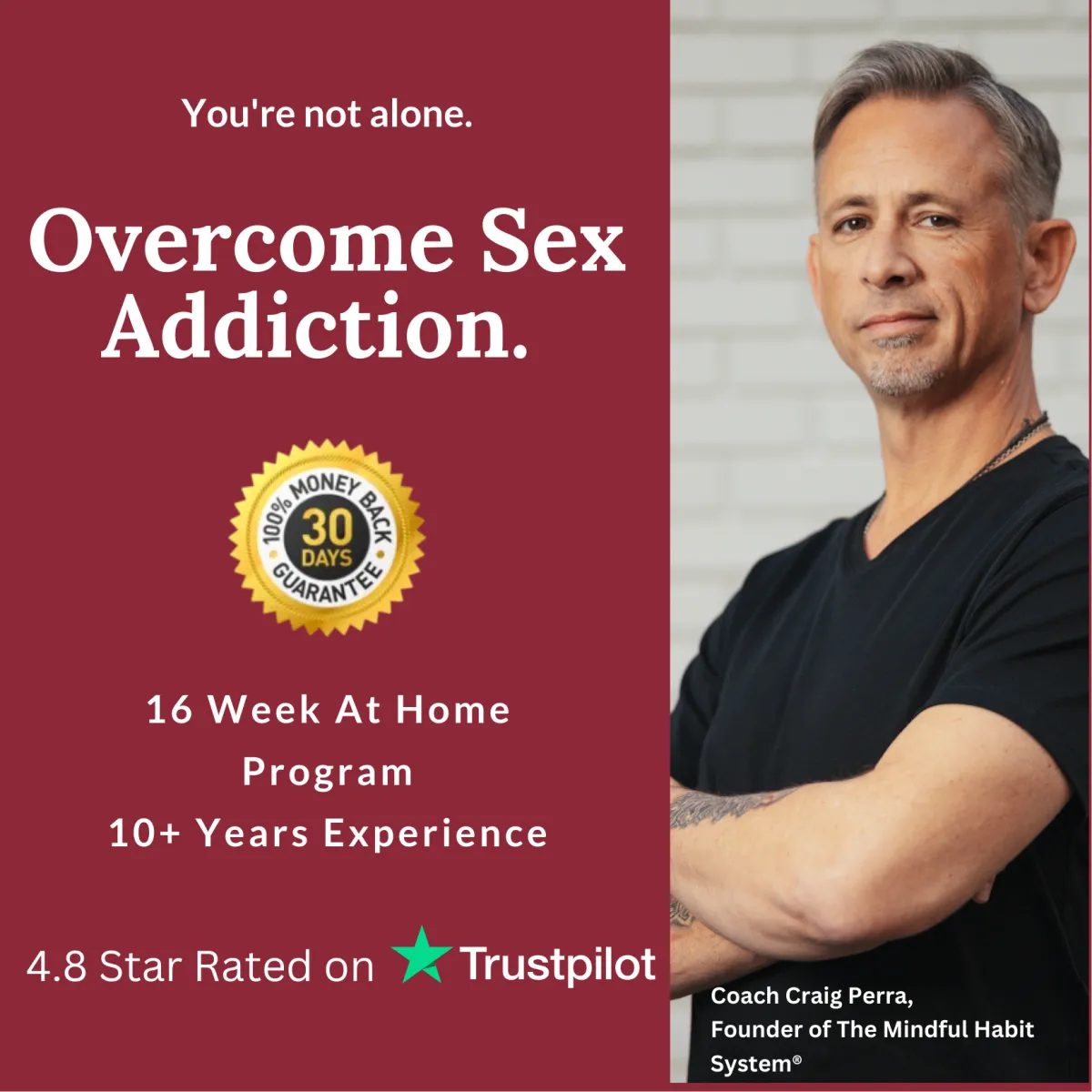
1. Impulse Control Strategies
The Mindful Habit emphasizes the development of practical skills to manage and reduce impulsive urges. By focusing on behavior modification techniques rooted in Cognitive-Behavioral Therapy (CBT), participants learn to:
- Identify Triggers : Recognize situations, thoughts, or emotions that lead to compulsive behaviors.
- Develop Coping Mechanisms : Implement strategies to control impulses, such as mindfulness and stress management techniques.
- Set Short-Term Goals : Work towards immediate, achievable objectives to reduce the frequency of unwanted behaviors.
This empowerment aligns with the key elements of the Impulse Control Approach, enabling individuals to take active control over their actions.
2. Holistic Therapeutic Practices
Understanding that compulsive behaviors often stem from deeper emotional and psychological issues, The Mindful Habit adopts a holistic approach to healing.
The program incorporates:
- Integrated Mental Health Help : Addresses co-occurring conditions like anxiety, depression, and unresolved trauma alongside compulsive behaviors from a practical coaching perspective that doesn’t keep you stuck in your problems.
- Mindfulness : Utilizes practices that enhance self-awareness and reduce stress, diminishing the urge to engage in compulsive acts.
- Somatic Therapies: Includes techniques that connect mind and body, such as breathing exercises and body scanning, to promote overall well-being.
- Lifestyle Enhancements : Encourages healthy eating, regular physical activity, and adequate sleep to improve mental and physical health.
By addressing the whole person—mind, body, and spirit—The Mindful Habit fosters comprehensive healing and long-term well-being.
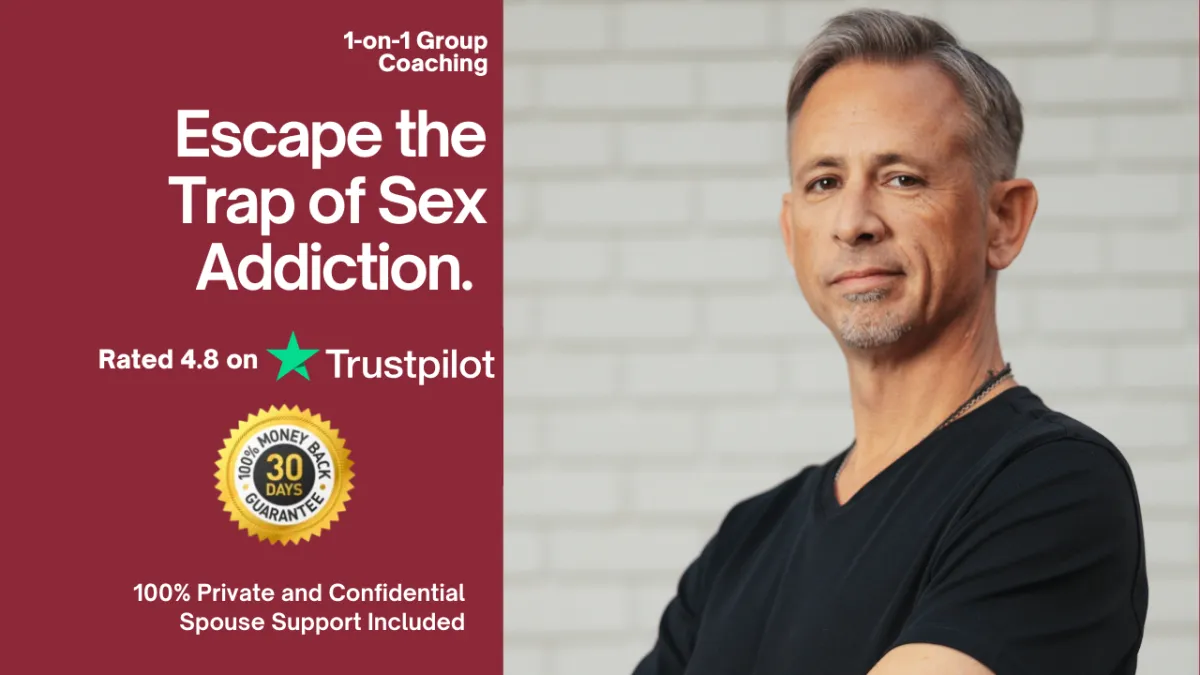
Personalized and Empowering Care
The Mindful Habit recognizes that each individual's journey is unique. The program offers:
- Structured and Tailored Recovery Plans : Customized strategies that consider personal challenges, strengths, and goals.
- Active Participation : Empowers individuals to take charge of their recovery, enhancing self-efficacy and motivation.
- Flexible Delivery and Convenient: Provides options for one-on-one coaching, group sessions, and online resources to accommodate different needs and lifestyles with days, nights, and weekend sessions: Powerful Recovery Without Leaving Home!
Evidence-Based and Effective
Combining the strengths of impulse control strategies and holistic therapies, The Mindful Habit is grounded in evidence-based practices that have helped thousands achieve significant improvements. Participants often report:
- Reduced Compulsive Behaviors : Effective management and decrease of unwanted impulses.
- Improved Mental Health : Alleviation of co-occurring conditions like anxiety and depression.
- Enhanced Quality of Life : Better relationships, increased productivity, and a greater sense of fulfillment.
- Healthy Sexuality rooted in fun, connection & integrity: The goal is healthy sexuality and The Mindful Habit helps you honor this powerful part of yourself.
Supportive Community
The program fosters a sense of community among participants, offering:
- Peer Support : Connection with others who understand similar challenges, providing encouragement and accountability.
- Expert Guidance: Access to professionals, coaches and therapists experienced in treating compulsive sexual behaviors through integrated approaches with over a decade of world-recognized experience.
Making an Informed Choice
Choosing the right path to recovery is a personal decision that should align with your values, needs, and goals.
The Mindful Habit offers a comprehensive and flexible approach that incorporates the key benefits of both the Impulse Control Approach and Holistic Therapies:
- Empowerment through Skill Development : Gain practical tools to manage impulses effectively.
- Holistic Healing : Address underlying issues contributing to compulsive behaviors for lasting change.
- Personalized Support : Receive tailored care that respects your unique journey.
By integrating these principles, The Mindful Habit stands as a compelling option for those seeking to overcome compulsive sexual behaviors and enhance their overall well-being.
Its focus on empowerment, comprehensive healing, and community support provides a strong foundation for sustainable recovery and personal growth.
In exploring your options, consider how programs like The Mindful Habit align with your personal beliefs and recovery goals.
Seeking a treatment path that resonates with you increases the likelihood of a successful and fulfilling journey toward healing.
Seeking Informed Recovery Help
Navigating the complexities of treating compulsive sexual behaviors can be challenging.
Seeking informed treatment involves exploring various options and choosing a path that aligns with your values and needs.
To help clients evaluate the effectiveness of The Mindful Habit Recovery Program, our founder Craig Perra offers everyone an unconditional 30-day money back guarantee for every one of their treatment programs.
Consult Multiple Professionals, including CSATs
- Diverse Perspectives : Engaging with professionals from different disciplines can provide a broader understanding of available treatments.
- Second Opinions : Don't hesitate to seek additional opinions if you're uncertain about a diagnosis or treatment plan.
- Interdisciplinary Collaboration: Some individuals may benefit from a team approach, involving psychiatrists, psychologists, and counselors who collaborate on care.
Steps to Take :
- Research Therapists : Look for professionals who specialize in different approaches to treating compulsive sexual behaviors. Finding the right program is paramount.
- Prepare Questions : Before consultations, prepare questions about their methods, experience, and views on the sex addiction model.
- Evaluate Comfort Levels : Pay attention to how comfortable you feel with each professional's approach and whether they respect your concerns. The personal connection that you have with your provider is the greatest predictor of successful outcomes.
- Review Testimonials: Some programs, like Mindful Habit Recovery, have hundreds of verified, public testimonials from real clients who have been through and are going through the program. You can read these testimonials by clicking here. Public testimonials mean the provider has been around for a while and has a record of helping clients create great results.

Questions to Consider before hiring a CSAT:
- What does the research say about the effectiveness of this treatment?
- Are there any potential risks or downsides to this approach?
- How does this model align with my personal beliefs and experiences?
Questions to Ask Your CSAT Therapist:
- Can you describe your approach to treating compulsive sexual behaviors?
- What types of therapy do you find most effective for issues like mine?
- How do you stay current with the latest research and developments in this field?
- Are you aware of the sex addiction controversy and how does that awareness impact your methods?
FAQs About CSATs, Controversies, and Treatment Options

Is sex addiction a recognized mental health disorder?
No, sex addiction is not recognized as a formal diagnosis by the APA in the DSM-5. The WHO includes Compulsive Sexual Behavior Disorder as an impulse control disorder in the ICD-11, not an addiction.
What are the criticisms of the CSAT sex addiction model?
Critics argue that the model is too problem-centric, lacks sufficient empirical support, overly focuses on the symptoms versus the root causes, may pathologize normal sexual behaviors, and could be influenced by religious, cultural, and/or moral biases.
Are CSATs effective in treating compulsive sexual behaviors?
Some individuals find CSATs helpful due to their specialized focus. However, it's important to consider alternative approaches and be aware of the controversies.
What alternative treatments are available?
Treatments focusing on impulse control, cognitive-behavioral therapy, and addressing underlying mental health issues are alternatives to the sex addiction model.
How can I choose the right therapist for me?
Research different therapeutic approaches, ask potential therapists about their methods and perspectives, and choose someone whose approach aligns with your needs.
Conclusion:
Navigating compulsive sexual behaviors can be challenging, and seeking professional help is a crucial step toward recovery. Understanding the controversies surrounding the sex addiction model and CSATs empowers you to make informed decisions about your treatment.
Whether you choose to work with a CSAT or explore alternative therapies, the most important factor is finding a supportive, qualified professional who respects your experiences and offers a treatment plan tailored to your unique situation.
Quick Links
Call Us To Schedule Your Appointment:
Copyright @ 2026. The Mindful Habit® System | All Rights Reserved




Craig and Michelle Perra aren’t just experts in theory, they’ve lived this experience through and through. With Craig’s video series and Michelle’s Partner’s Survival Guide, every couple experiencing the challenge of porn or sex addiction can overcome this and take the steps down a new path.
The Mindful Habit System Is A Structured, Science Based Attack On Your Sex & Porn Addiction. You Will Learn:

Increased Self Control
Habits rule your life. Learn how to interrupt your habit cycle and respond to triggers in a healthy way so you have control in all areas of your life.
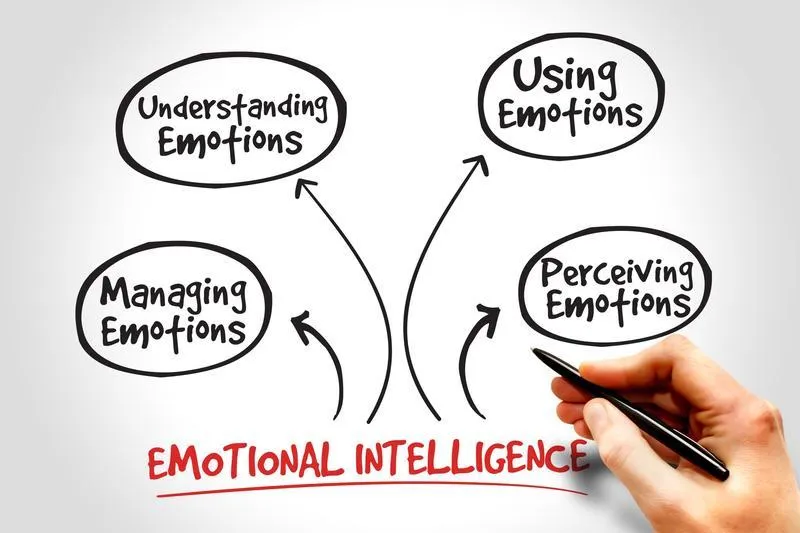
Higher EQ
You are a slave to your past. Quickly elevate your emotional intelligence (EQ) by diving deep into the patterns collected in childhood that drive behaviors today.

Your Unmet Needs
All your negative behaviors are a function of your unmet needs. Learn how your addiction is meeting these needs to get these needs met in a healthy way.

Create Healthy Sexuality
Your sexual energy is powerful. Embrace this power and build sexually healthy belief systems and actions to enhance your life in a powerful way.

Sustainable Results
Avoid the relapse trap. Learn to create sustainable results so you can manage life’s inevitable challenges and create a system that drives long term success.

Non 12-Step Approach
The disease based addiction model doesn’t work for most people. Instead of treating the symptoms, treat the root cause of your addiction to create life altering change.

Tools to Succeed
Learning about stuff is not enough. Master critical “life-hacking” tools to effectively respond to triggers, failures, challenges,. sexual desire, and negative self-talk.

Massive Life Changes
The cure is the aggressive pursuit of a great life. Learn step by step how to cure your sex and porn addiction by aggressively pursuing a great life.
SEE WHY THOUSANDS OF PEOPLE HAVE TURNED TO CRAIG PERRA & THE MINDFUL HABIT
Success doesn’t happen overnight, but it doesn’t happen with zero effort either. Craig has personally experienced the mindset you’re struggling with, and he’s living proof that turning your life around begins with the first step.
Craig Perra’s 12-Week Core Training Recovery Program lets you take your first step from the comfort of your own home, with the freedom of accessing his insights on all your devices. For those of you who need more time than 12 weeks, we give you a full 16 weeks to complete this program.
Verified Client Reviews
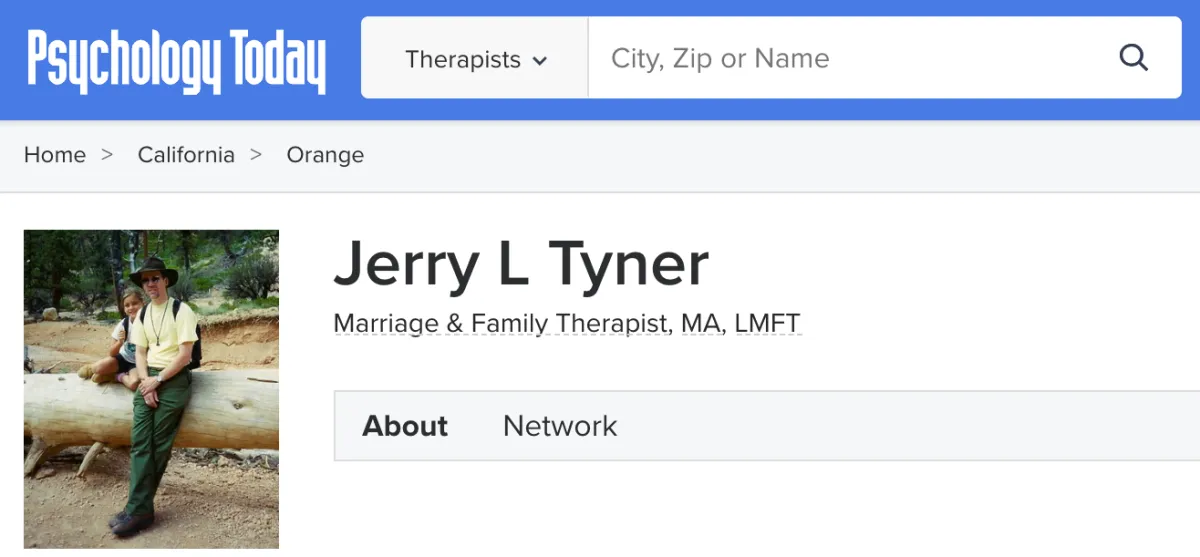
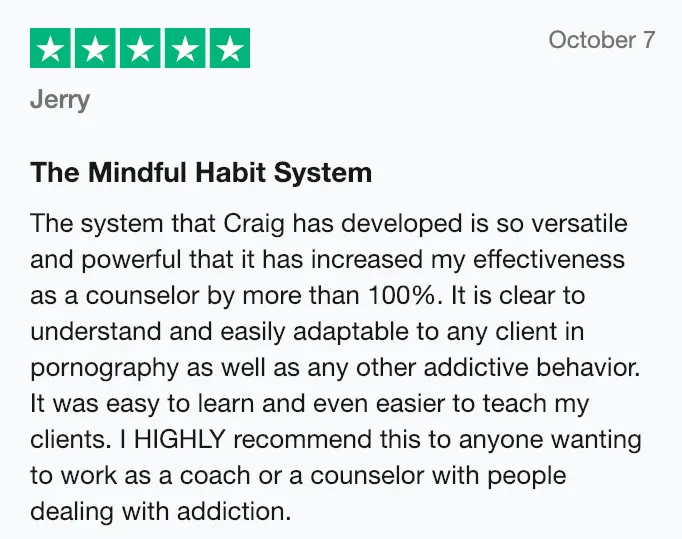
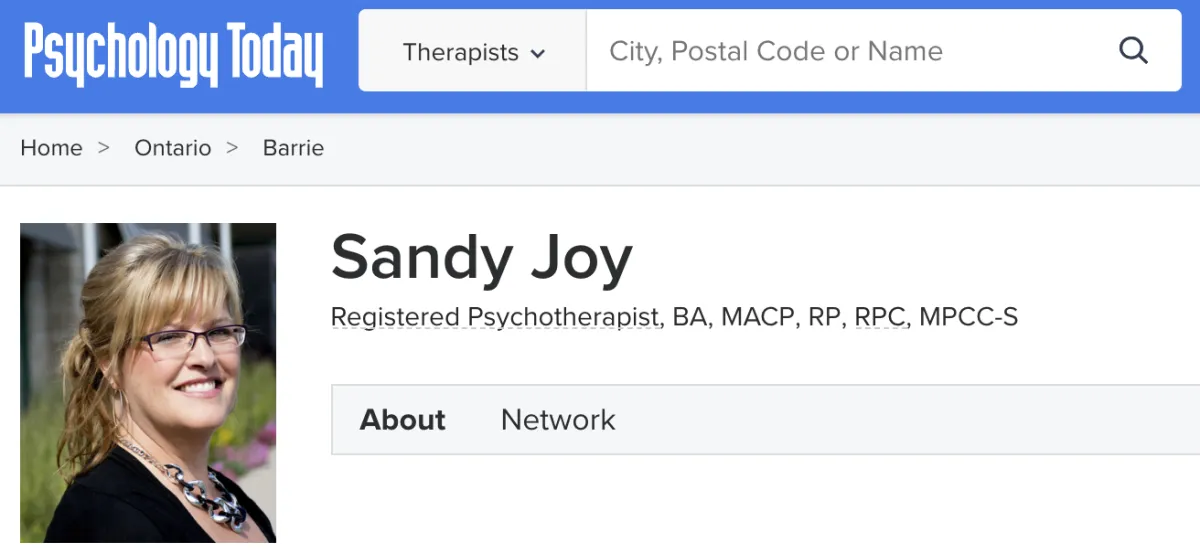
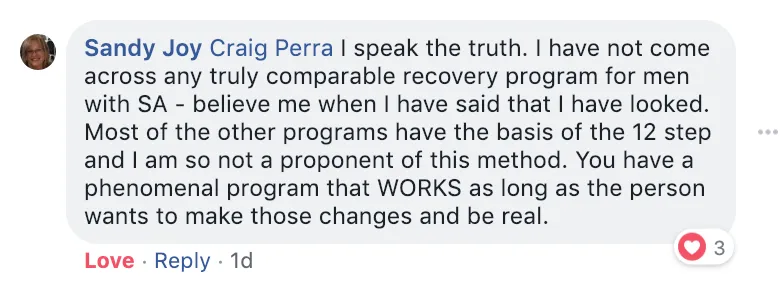
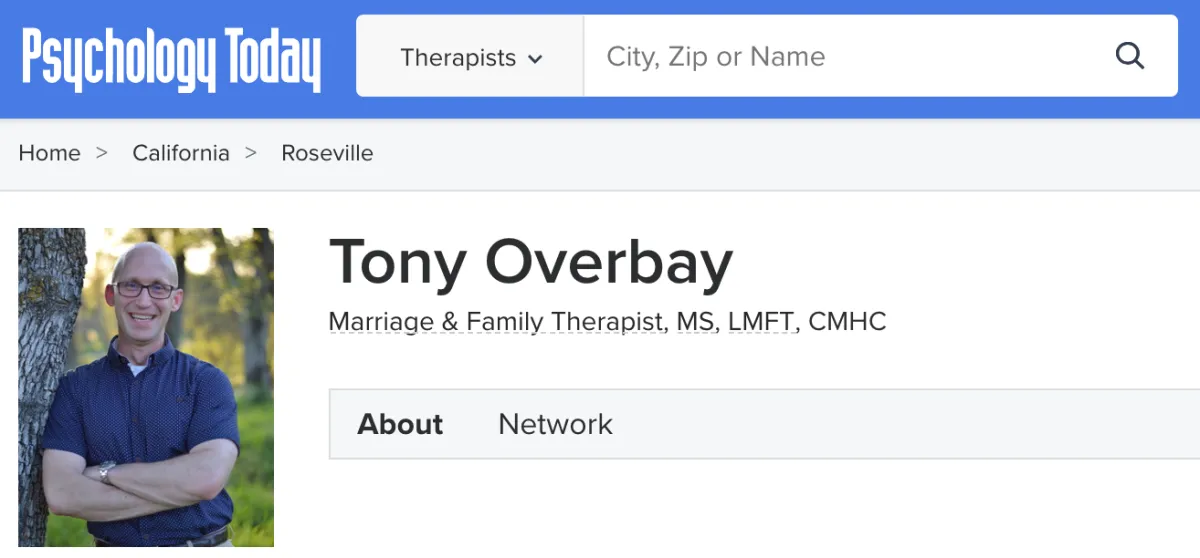
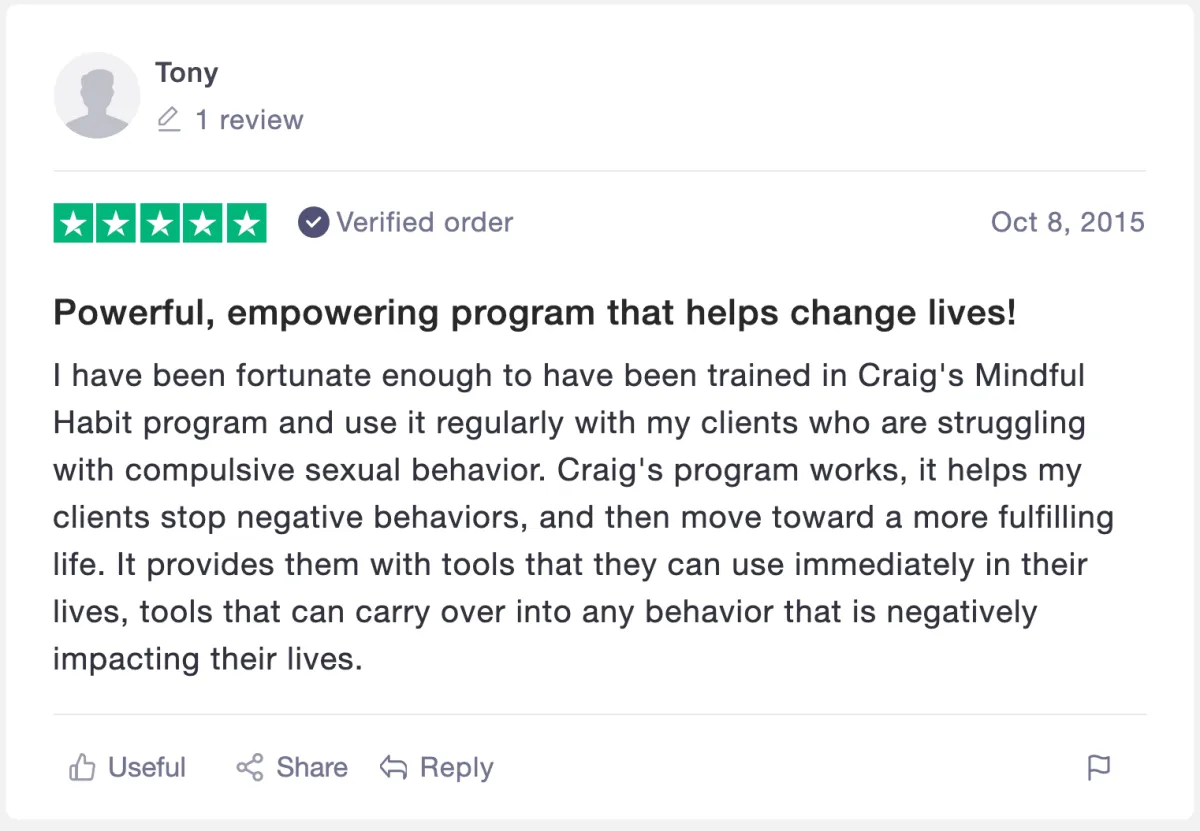
Not Only Experts, But Men All Over The World Recommend The Mindful Habit System
THE MINDFUL HABIT ONLINE CORE TRAINING RECOVERY PROGRAM INCLUDES:

35+ Video Lessons
The same lessons I teach my one on one clients to teach you the skills you need to be successful.

Digital Workbook
The same workbook my one on one clients use to guide them through the program.

Weekly Webinar Q&A
Weekly webinars with Mindful Habit Coaches to keep you on track and staying on the path to success in your journey.

Partner’s Guide
Michelle Perra’s captivating Partner’s Survival Guide is an absolute must forstruggling couples.

Step-by-Step Path
Step by step instructions to guide you through the program with ease so you never wonder what to do next.

40 Exercises
Learn how to specifically incorporate the lessons into your life so you get results.


